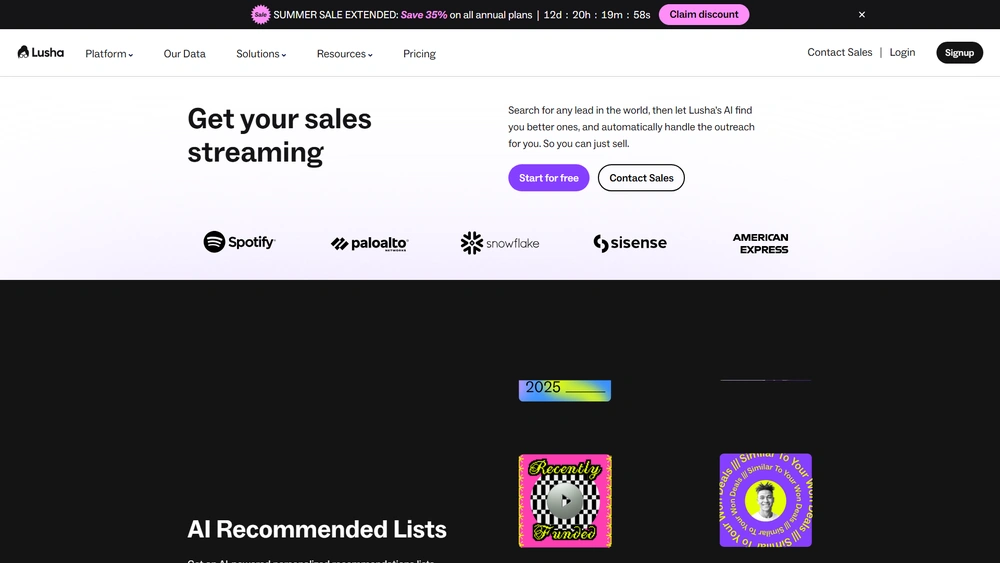Lusha Overview & 2026 Industry Position
Lusha has carved a noteworthy niche in the B2B data intelligence and prospecting space. With over a decade under its belt, the company continues to refine how professionals find, verify, and engage with leads across industries. As of 2026, Lusha solutions serve over 1 million professionals, powering sales, recruitment, and account-based marketing (ABM) with clean, GDPR-aligned contact data.
With AI-native search tools, CRM-native workflows, and unmatched international phone/email accuracy, Lusha is evolving from a lead-enrichment tool into a business-critical sales intelligence platform. In 2026, it directly addresses market shifts: tighter B2B conversion pipelines, growing demand for real-time verified contacts, and the need to unify sales ops into actionable CRM data streams.
From Launch to 2026: Lusha’s Journey
Founded in 2016 in Tel Aviv, Lusha began as a browser plugin offering direct contact info for LinkedIn profiles. Over the years, it evolved into a full-suite B2B intent and data platform. Key milestones:
- 2016: Lusha launches Chrome extension to enrich contacts via LinkedIn.
- 2018: Introduced the Lusha Dashboard for lead management.
- 2020: Series A funding fuels enterprise features and enriched outreach tools.
- 2021: Lusha reaches 500,000 users and adds granular GDPR compliance layers.
- 2023: Major product overhaul brings team workspaces, API access, and deeper CRM integrations.
- 2025: Launch of real-time Contact Builder AI and Smart Segments for ABM.
2026 Strategy Thesis: Lusha aims to be the gold standard for GDPR-compliant, AI-dynamic, CRM-embedded prospecting intelligence for SMB and mid-market revenue teams.

Lusha Key Features
Lusha provides a unified platform that helps sales and recruiting professionals discover, verify, and organize B2B contacts. Core features include:
- Contact Enrichment: Email, phone, company firmographics, and job titles across 100M+ verified records.
- Chrome Extension: Real-time contact reveal on LinkedIn, Gmail, Salesforce, and company sites.
- Prospect Search: Advanced filtered prospecting by job title, location, industry, and role in buying committee.
- Contact Builder AI: NEW 2025 tool that suggests high-fit prospects using account intelligence models.
- Smart Lists: Shared team folders, tagging, and export options to CRMs and CSVs.
- API/CRM Sync: Auto-export to HubSpot, Salesforce, Zoho, and over 20 integrations.
- Intent Signals (beta): Track buyer intent based on job transitions and digital footprints.
Workflow & UX
The Lusha platform offers an intuitive experience designed around fast, daily prospecting use. Its hallmark is simplicity—minimalist dashboards, column-dense views, and quick actions.
- Chrome extension hovers seamlessly on LinkedIn and Gmail to surface data on demand.
- Search bar feels modeled after modern search engines with keyword + filter autonomy.
- Contact sheets allow for drag-and-drop into custom saved lists.
- Exports are one-click to CSV or direct to integrated CRMs with mapping options.
Lusha Pricing Analysis & Value Metrics
As of July 2026, Lusha uses a transparent credit-based plan structure built to scale from individuals to growth teams:
| Plan | Starting Price (Monthly) | Credits/User | Team Features |
|---|---|---|---|
| Free | $0 | 5 | None |
| Pro | $39 | 40 | Yes |
| Premium | $79 | 80 | Priority Support, API Access |
| Scale | Custom | Unlimited | Dedicated CSM, Custom Fields |
Value Verdict: Lusha delivers a strong ROI at all tiers, especially for teams maximizing CRM sync and AI-assisted prospecting. SMBs favor the Pro plan; mid-market leans Premium.
Competitive Landscape
| Solution | Differentiator | Best For | Starting Price |
|---|---|---|---|
| Lusha | GDPR-safe phone + email combo at scale | SMB Sales | $0 |
| ZoomInfo | Deeper intent data, more workflows | Enterprise GTM | $2,500+/mo |
| Cognism | EU-specific data regulatory depth | EU SDR Teams | $300/mo |
| Apollo.io | Omnichannel outreach tools + data | Outbound marketers | $49/mo |
Real-World Use Cases
- Sales Reps: Source fresh leads via title/company filters, then export to HubSpot in one click.
- Recruiters: Use contact info to reach decision-makers and passive candidates on LinkedIn.
- Revenue Ops: Integrate real-time verified data into Salesforce and reduce bounce rates.
- ABM Campaigns: Build Smart Lists aligned to niche ICP segments using Contact Builder AI.
Integrations & Ecosystem
Lusha plays well with others. Its integrations span CRMs, messaging apps, spreadsheets, and customer enrichment tools:
- CRM: Salesforce, HubSpot, Zoho, Pipedrive, Dynamics 365
- Communication: Gmail, Outlook, Slack
- Automation: Zapier, Tray.io, Make
- APIs: Full REST support for custom developer access
Pros & Cons
- GDPR-compliant email + phone reach
- Affordable entry-level pricing
- Fast onboarding with CRM auto-export
- Data density lower for APAC regions
- Limited outreach features compared to Apollo
- Credits-based pricing requires close monitoring
Pro Tip: Lusha credits don’t roll over—opt for a one-month trial on Premium if your team’s reach volume varies week to week.
Final Thoughts
Lusha excels as a lean, scalable prospecting engine, especially for SMBs and agile mid-market teams prioritizing fast outreach and CRM accuracy. It’s not as feature-heavy as ZoomInfo or Apollo.io on outbound workflows, but its contact data quality and simplicity make it ideal for teams more focused on people than platforms.
If you’re looking to unify contact validation, segmentation, and CRM ingestion into one clean loop, Lusha software delivers exactly that with minimal overhead.
Lusha FAQ
Yes. Lusha maintains GDPR and CCPA alignment via mandatory user consent, data removal requests, and audit-calibrated sourcing methods.
Lusha delivers business phone numbers, personal and work emails, job roles, social profiles, and company info like headcount and revenue estimates.
Yes. Lusha integrates natively with both platforms, allowing you to sync leads, companies, and activity directly into your CRM.
Yes, you can get started with 5 free credits per month without entering payment information.
Lusha focuses on affordability, nimble UX, and GDPR-safe contact sourcing, whereas ZoomInfo targets large-scale pipeline orchestration with deeper intent and organizational charts.

